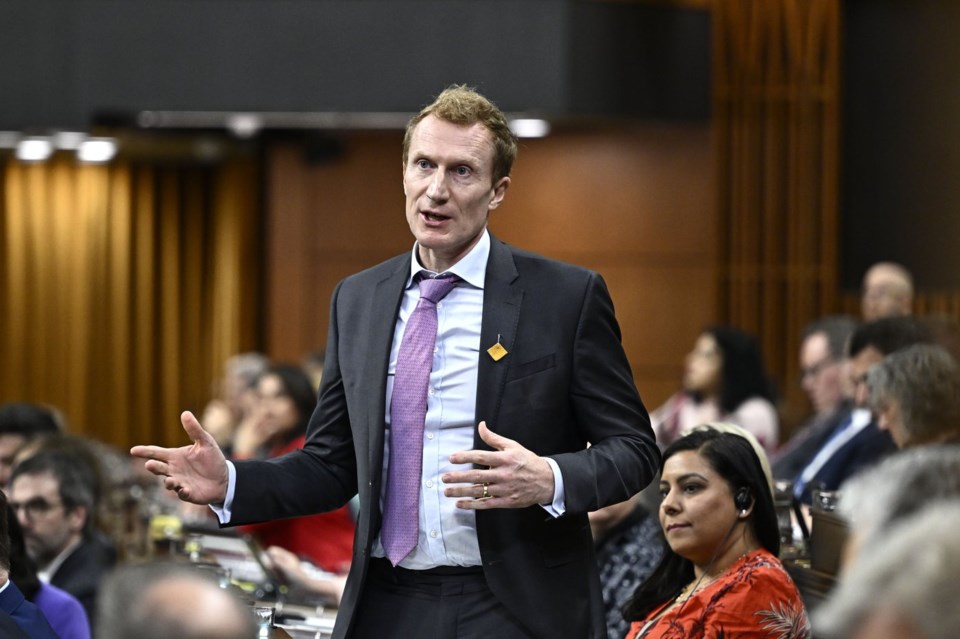OTTAWA ŌĆö Immigration Minister Marc Miller says Israel seemed to be on the verge of approving a program to get Palestinian relatives of 91įŁ┤┤s out of the Gaza Strip before the country's invasion of the town of Rafah.
"While we have been limited in our success, it is certainly not for lack of trying," Miller told the House immigration committee Monday.
"We won't give up on bringing family members to safety."
His comments come amid mounting criticism over measures introduced months ago that were meant to bring relatives of 91įŁ┤┤s from conflict zones in the Gaza Strip and Sudan to safety.
Miller announced Monday an increase in the number of applications that will be processed for those leaving the Gaza Strip through that program, but his department isn't sure if any Palestinians have actually arrived in Canada through those means.
The Gaza program initially had a cap of 1,000 applications that could be "accepted into processing," meaning that all paperwork had been completed ahead of an eventual biometric processing in Egypt. But Miller says 2,903 applications had reached that step as of May 24.
Miller has now expanded that to 5,000 applicants.
The department says it has issued 179 temporary-resident permits through the Gaza program as of April 29, but it isn't known whether anyone has actually reached Canada.
The NDP has accused the government of bungling both the Gaza and Sudan programs, and not learning from the issues that emerged in resettling Afghans after the Taliban's takeover of Kabul in August 2021.
Relatives in Canada say they were given mixed information from Ottawa about the program, which meant some people missed a chance to get out of Rafah by other means.
A memo obtained through Access to Information shows the Immigration Department expected "high volumes" of applications from the outset of the program, despite the 1,000 person cap.
The memo, signed by Miller in December, says that limiting the number of arrivals to a maximum of 1,000 would provide some certainty, but that high volumes of applications were anticipated.
The memo notes there are were 45,905 91įŁ┤┤s who have Palestinian ethnic or cultural origins counted in the 2021 census.
Miller said that the program he launched in early January requires co-operation from the Israeli government agency that co-ordinates work in Palestinian territories, known as COGAT. He claimed this did not happen for months.
"Very recently, we have had ŌĆö up to the closing of the Rafah crossing again on May 7 ŌĆö some positive signals from the Israeli government that this program would be recognized, and that the processing through COGAT would be done in a timely fashion," Miller testified.
Rafah is a town on the border with Egypt, which has been the only crossing that has allowed people to leave Gaza, and only under strict protocols by both Israel and Egypt. It has become a refuge for Palestinians fleeing Israeli airstrikes and military assaults in the north of the Gaza Strip.
But about three weeks ago Israel proceeded with an offensive in Rafah, ignoring pleas from Canada, the U.S. and multiple other countries not to do so. Israel says Rafah has become a Hamas stronghold and is crucial to routing the militant group that killed 1,200 people in Israel last October.
Gruesome images of children injured in airstrikes and fires burning among encampments of displaced people, led to global outcry Sunday. The Hamas-run Health Ministry in Gaza reports 36,000 people have been killed in the war, including combatants.
Foreign Affairs Minister M├®lanie Joly reiterated her calls for a ceasefire Monday.
"We are horrified by strikes that killed Palestinian civilians in Rafah," she wrote on the platform X. "This level of human suffering must come to an end."
The Sudan program is for permanent residency while the Gaza program is capped at three years of residency, which Miller said was largely based on sensitivities around the idea of Israel again occupying the Palestinian territory.
"There are very important geopolitical considerations, particularly some of the rhetoric around the emptying of Gaza, and the perception that Canada would be participating in that," he testified. "That is the reason, principally, that we did not make it permanent."
Meanwhile, civil war in Sudan broke out last spring, yet Miller said he doesn't expect any relatives to make it to Canada until the late fall at the earliest.
Family members say officials have cited delays with fingerprinting and other biometric requirements. But Miller noted the Sudan program is a more thorough process because it involves permanent residency.
Miller said Ottawa is accepting 3,250 applications under the Sudan program, from which about 7,000 people will arrive in Canada.
He said that number is based on the capacity his department and "security partners" has to handle logistics, but might be expanded.
This report by The 91įŁ┤┤ Press was first published May 27, 2024.
ŌĆö With files from Sarah Smellie in St. John's.
Dylan Robertson, The 91įŁ┤┤ Press



